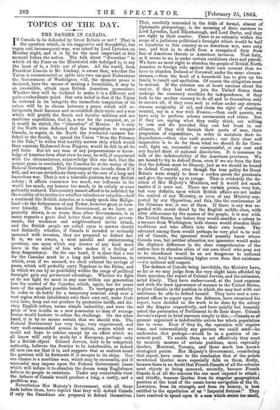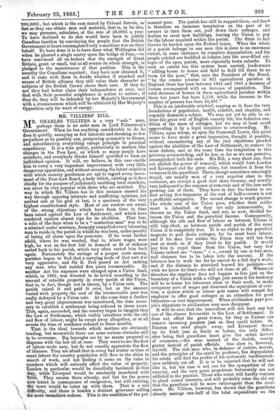TOPICS OF THE DAY
THE DANGER IN CANADA.
IS Canada to be defended by Great Britain or not ? That is the question which, in his suggestive and thoughtful, but vague and inconsequent way, was raised by Lord Lyveden on Monday night, and it is by far the most important at this moment before the nation. The talk about " discretion " in which all the Peers on the Ministerial side indulged is, to say the least of it, a little out of place. All the world, from President Lincoln to Mr. Lindsay, is aware that, whether the Union is reconstructed or splits into two unequal Federations the Government of Washington will, the moment peace is declared, have the means of making a formidable, it may be an irresistible, attack upon British American possessions. Whether they will be inclined to make it is a different and quite a subordinate point. Our own belief is that if the Union be restored in its integrity the immediate temptation of its rulers will be to choose between a peace which will re- invigorate their finances and re-establish their trade and a war which will gratify the South and involve military and not maritime expeditions, that is, a war for the conquest, or, as it would be styled, the "liberation" of Mexico. It is only if the North were defeated that the temptation to conquer Canada, to regain in the North the territorial vastness for- feited in the South, to spread the Union "from the Potomac to the Pole," to widen that terribly narrow strip which would then separate Richmond from Niagara, would be felt in all its evil force. But let any man of any prepossessions or know- ledge of America form what view he may, he will, if acquainted with the circumstances acknowledge this one fact, that the instant peace is concluded, the Canadas lie at the mercy of the Federal Government. That Government can invade them if it will, and we can revindicate them only at the cost of a long and hazardous war. That is not a tolerable position for any British colony; it affects commerce too much, our influence in the world too much, our honour too much, to be calmly or even patiently endured. This country cannot afford to be indebted for the security of its territories wheeher valueless or valuable—half a continent like British America or a sandy speck like Heligo- land—to the forbearance of any Power, however great or how- ever friendly. The American Government, as we have re- peatedly shown, is no worse than other Governments, is in many respects a great deal better than many other govern- ments, but weakness and neighbourhood invite attack, and the British people are called upon to answer clearly and distinctly whether, if Canada is invaded or seriously menaced with invasion, they are prepared to defend her. It is, we are aware, a most painful and embarrassing question, one upon which any answer of any kind must leave in the mind of him who makes it a feeling of deep despondency. On the one hand, it is clear that a war for the Canadas must be a long and terrible business, in which, even if we succeed, we shall exhaust the savings of years, which will probably carry Napoleon to the Rhine, and in which we can by no possibility within the range of political foresight gain any permanent advantage. Whether we fight or do not fight we must in any case within one generation lose the control of the Canadas, which, again, has for years been of the smallest possible benefit. To mortgage posterity in order to do battle for a temporary nominal sway over a vast region whose inhabitants own their own soil, make their own laws, keep out our produce by protective tariffs, and dis- obey English orders seems simple imbecility, and were the prize of war Acadia as a new possession no man of average brains would hesitate to refuse the challenge. On the other hand, it is by no means certain that we should win. The Federal Government has very large, very experienced, and very well-commanded armies in motion, armies which we could not hope to subdue except by an effort which we all know will only be made for a European, perhaps only for a British object. Colonel Jervois, held to be competent authority, believes the frontier to be indefensible, as indeed all men can see that it is, and suggests that as matters stand the garrison will be fortunate if it escapes to its ships. Our one chance is a maritime war, which may be successful, and if successful may impose upon the Federal Government losses which will induce it to abandon the dream many Englishmen believe its people to entertain. Under any conceivable view the defence of Canada would produce a long, a costly, and a profitkss war.
Nevertheless Her Majesty's Government, with all these facts before them have replied that they will defend Canada if only the Canadians are prepared to defend themselves.
That, carefully concealed in the folds of formal, almost of diplomatic phraseology, is the meaning of their answers to Lord Lyveden, Lord Ellenborough, and Lord Derby, and they are right in their resolve. There is no calamity within the scope of a judicious politician's foresight which would be half so injurious to this country as an American war, save only one, and that is, to skulk from a recognized dray front fear of American threats or American invasion. That duty, as it seems to us, is under certain conditions clear and patent.. We have no more right to abandon the people of British Nortlat America to foreign rule against their own consent than we have to abandon Ireland or Cornwall under the same circum- stances,—than the head of a household has to give up his family to insult and spoliation. Of course the obligation must be mutual. If the colonies are at heart careless about the matter, if they had rather join the United States than undergo the necessary sacrifices for independence, if they look to the mother country to do all and to themselves only to receive all, if they even seek to refuse under any circum- stances reciprocity of aid, and claim the right of standing- neutral, say in a war with France,—then cadit qucestio, we have only to perform solemn ceremonials and retire. But if they are saying -what they really think, are willing. to arm and die provided they can but trust in our alliance, if they will furnish their quota of men, their proportion of expenditure in order to maintain their in- dependence,—then also c:tdit qucestio ; our duty clear and imperative is to do for them what we should do for Corn- wall, fight on, successful or unsuccessful, at any cost anci any hazard short of national dissolution. It is nonsense to talk of the indefensibility of the American provinces. Vire are bound t) try to defend them, even if we see from the first that the defence must be illusory, just as we should be bound to defend Cornwall, even though the true policy for Great Britain were simply to draw a cordon across the peninsula. and give the county up to ravage. That is evidently the de- cision of Her Majesty's Ministers, and it would not much. matter if it were not. There are certain points, very few, but very definite, upon which British affairs are not under the control of any Ministry, or even of any Ministry sup- ported by any Opposition, and this, like the continuance of the Crimean war, is one of them. If there is any war re- garded with secret dread by the English middle class, witfr utter abhorrence by the masses of' the people, it is war with the United States, but before they would sacrifice a colony to a menace from Washington, both classes would abandon their traditions and take affairs into their own hands. The. educated among them would perhaps be very glad to be well rid of Canada, the ignorant would scarcely know where- Canada was, but neither education nor ignorance would make- the slightest difference in the clear comprehension of the- nation that to abandon allies of our own blood who pray not. to be abandoned would be an act dangerous to national existence, fatal to something higher even than that existence- -the national self-respect.
The defence of Canada being inevitable, the Ministry have,. so far as we may judge from the very slight hints afforded by their speeches, the report of Colonel Servois, and the estimates,. acted wisely. They have endeavoured, at the least expense and with the least appearance of menace to the United States, to place Canada in the position in which she may best with our assistance be able to defend herself. They have sent a com- petent officer to report upon the defences, have examined his report, have decided on the work to be done by the colony and the Empire respectively, and have quietly but honestly asked the permission of Parliament to do their share. Colonel Jervois's report in brief amounts simply to this :—Canada as at present organized is indefensible unless her whole population rise in arms. Even if they do, the operation will require time, and intermediately any garrison we could send—he underrates that perhaps—would be in a position of im- minent peril. To enable them to act effectively they must be securely masters of certain positions, more especially Quebec, Montreal, Toronto, and three much less known strategical points. Her Majesty's Government, considering that report, have come to the conclusion that of the points mentioned Quebec more especially falls on them, firstly, because there is no doubt that French Canada of all the colonies most objects to being annexed, secondly, because French Canada is of all the colonies the one most exposed to attack ; and thirdly, because Quebec from its singular geographical position at the head of the ocean-borne navigation of the St. Lawrence, from its strength, and from its history, is best entitled to the appellation of aft "Imperial fortress." They have resolved to spend upon it a sum which seems too small,
200,0001., but which is the sum stated by Colonel jervois, as fast as they can obtain men and material, that is, as he also, we may presume, calculates, at the rate of 50,000/. a year. To have declined to do this would have been to justify Canadian inaction by convincing the people that the British Government at heart contemplated only a maritime war on their behalf. To have done it is to have done what Wellington did when he planted a single sentry upon the bridge of Iena,—to 'have convinced all on-lookers that the strength of Great Britain, great or small, but at all events its whole strength, is ' pledged to the maintenance of that position. This is the security the Canadians required ; they have now obtained it, and it rests with them to decide whether if attacked and secure of British alliance they still value their character as subjects of the British Crown above their ease. If they do ttot they had better claim their independence at once, and deal with their powerful neighbours as nation to nation ; if they do, they will be defended by her Majesty's Government with a strenuousness which will be criticized by Her Majesty's Opposition only for want of energy.



































 Previous page
Previous page